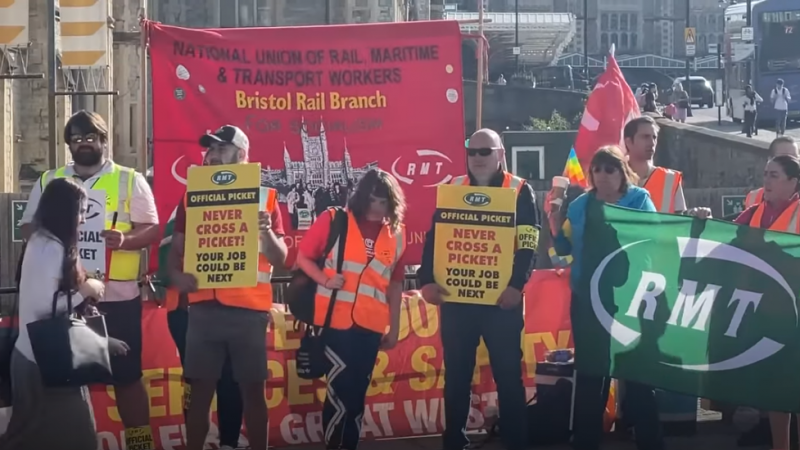As Truss and Sunak are branded “Thatcher tribute acts” for threatening the right to strike, momentum builds to secure this fundamental right.

The ‘summer of discontent’ is living up to its name, with more train strikes announced as drivers at nine rail companies are to walk out over pay, and the first national telecoms strike since 1987 gets underway.
Amid the climate of growing unrest over the pay and conditions of workers as CEOs and company bosses net eye-watering salaries and bonuses, the two candidates left in the race to become prime minister are threatening the right to strike.
During a BBC TV debate, both Liz Truss and Rishi Sunak promised to clamp down on rights for workers to take strike action if they became prime minister.
When pressed by moderator Sophie Raworth about whether they would “ban strikes in essential public services like the railways,” Sunak said: “Yes, it’s a manifesto promise, and we need to deliver on it.” Truss also said she would “do it.”
Truss has also since confirmed that she would raise the minimum threshold of support for strike action from 40% of workers to 50%. The frontrunner to be the next prime minister has also promised to double the notice period for industrial action to four weeks. Truss would also stop union members from receiving tax-free payments from their unions on strike days.
‘Biggest attack on civil rights since they were legalised’
Truss’s proposals were slammed by trade unions, with RMT general secretary Mick Lynch saying they amount to the “biggest attack on trade union and civil rights since labour unions were legalised in 1871.”
“Truss is proposing to make effective trade unionism illegal in Britain and to rob working people of a key democratic right.
“If these proposals become law, there will be the biggest resistance mounted by the entire trade union movement, rivalling the general strike of 1926, the Suffragettes and Chartism,” said Lynch.
Condemnation to what has been referred to as a “Thatcher tribute act” for threatening the right to strike is not confined to trade unions, and much of the public seem critical of the move.
Protect the right to strike
In opposition towards plans to clamp down on rights for workers to take strike action, a petition has been launched calling on Sunak and Truss to stop any plans to ban strike action in essential services, and to protect this fundamental right.
The ‘Protect the right to strike’ petition has already been signed by more than 23,000 people. It states how the public and workers are clear: “Organised, official strike action is the right of any workforce and their only protection against abuse by employers.”
The petition has been launched by Organise, which campaigns for a world in which “decent, fairly paid work is available and accessible to all, and where all of us are treated with dignity and respect at work.”
Organise notes how during a TV debate, both candidates to be our next prime minister said they would ban strikes on transport networks and other essential services.
“Having the right to take action to make working conditions safe and secure is a fundamental right that must never be undermined,” says Organise.
Some supporters of the petition have posted reasons as to why they have put their signature to it.
“It’s a basic human right and it’s the only weapon we have against an extremist government such as the one we have at the moment,” wrote one supporter.
“Typical Conservatives,” wrote another.
As well as the public, politicians have been quick to share their support of the petition. Among them is Ruth George, former Labour MP for the High Peak, and councillor for Whaley Bridge, who wrote on Facebook:
“Working people need to be able to fall back on the right to strike so they can negotiate fair pay, prevent exploitation, and give protection from unsafe working practices. Striking is always a last resort, and the UK already has one of the lowest strike rates of any developed democratic country.
“The Tories’ proposals to limit the right to strike would drive down pay at a time when working people and their families are struggling to get by. That’s why I’ve signed this petition.”
The petition comes as unions warn the UK could face a general strike this year as rail workers voted for more strike action and Keir Starmer sacked shadow transport minister Sam Tarry who carried out broadcast interviews at Euston Station next to striking RMT workers.
Mick Lynch has called for a general strike in retaliation to ministers’ threats to curb industrial action. The RMT boss warns of “the biggest resistance mounted by the entire trade union movement.”
Gabrielle Pickard-Whitehead is a contributing editor to Left Foot Forward
Left Foot Forward doesn't have the backing of big business or billionaires. We rely on the kind and generous support of ordinary people like you.
You can support hard-hitting journalism that holds the right to account, provides a forum for debate among progressives, and covers the stories the rest of the media ignore. Donate today.



